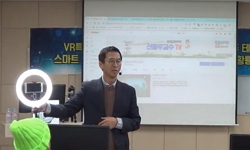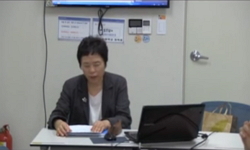The aim of this study is to form and introduce Distance Learning, particularly Cyber education in Mongolia based on the Information and Communication Technological achievement and development. Information and Communication Technology is rapidly devel...
http://chineseinput.net/에서 pinyin(병음)방식으로 중국어를 변환할 수 있습니다.
변환된 중국어를 복사하여 사용하시면 됩니다.
- 中文 을 입력하시려면 zhongwen을 입력하시고 space를누르시면됩니다.
- 北京 을 입력하시려면 beijing을 입력하시고 space를 누르시면 됩니다.
https://www.riss.kr/link?id=T13268441
- 저자
-
발행사항
서울: 상명대학교 일반대학원, 2013
-
학위논문사항
학위논문(박사) -- 상명대학교 일반대학원 , 한국학과 , 2013. 8
-
발행연도
2013
-
작성언어
한국어
- 주제어
-
발행국(도시)
서울
-
기타서명
A Study on Learning Environment and Design for Cyber Education in Mongolia
-
형태사항
204 p.; 26 cm.: 삽화,표.
-
일반주기명
상명대학교 논문은 저작권에 의해 보호받습니다
지도교수:이지영
참고문헌 - 소장기관
-
0
상세조회 -
0
다운로드
부가정보
다국어 초록 (Multilingual Abstract)
Information and Communication Technology is rapidly developing field in the world and is also penetrating broadly in our living society and economy. One of the examples influencing in educational field is Information and Communication Technological achievement, Cyber Education which is a type of Distance Learning.
In order to survive global competition, people need to update and increase their knowledge and skills immediately. Consequently people are able to keep pace with social development.
Not depending on time and location, offering flexible, accessible and systematic learning in cyber environment is one of the essential means of education.
There are no act related to learning techniques, making contents and teaching tutors which are the components of cyber learning in Educational Law, in Mongolia. Additionally there is no clear understanding about cyber learning even there is no legal regulation to conduct it throughout the nation.
Based on the above real situation, this paper clarifies the following points:
1. Make a study to form legal framework for Distance learning based on the experience of Korean Cyber Universities
2. Find every possibility to open Cyber University for under populated Mongolians who have vast area to provide their educational demands using educational technology.
As a result of environmental study on Information Communication Technology in Mongolia, I think it is the best suitable way to adapt cyber education examples, which is being developed successfully in other countries, appropriating for Mongolian situation. In that case it is possible to solve the problems including technical devices and preparation and production of tutors and experts who are able to work and teach in cyber environment which is the most deficient points in Mongolia.
Furthermore, even though there is no legal regulation for Distance Learning in Cyber Environment, a few universities already started conducting Internet based learning courses in cyber environment .
In case of forming legal frameworks related to Distance Learning into the Law of Education as Distance learning is an appropriate method both in and out class learning, it is necessary to process the amendments about the standards for techniques and technology, experts and tutors.
The additional important thing is to make up Information Technology environment to conduct internet based learning in cyber environment. For instance there should be every educational technologies and tools such as personal computer, speedy internet, and technological infrastructure. These are the also problems facing to conduct Distance Learning too.
The aim of this study is to form and introduce Distance Learning, particularly Cyber education in Mongolia based on the Information and Communication Technological achievement and development.
Information and Communication Technology is rapidly developing field in the world and is also penetrating broadly in our living society and economy. One of the examples influencing in educational field is Information and Communication Technological achievement, Cyber Education which is a type of Distance Learning.
In order to survive global competition, people need to update and increase their knowledge and skills immediately. Consequently people are able to keep pace with social development.
Not depending on time and location, offering flexible, accessible and systematic learning in cyber environment is one of the essential means of education.
There are no act related to learning techniques, making contents and teaching tutors which are the components of cyber learning in Educational Law, in Mongolia. Additionally there is no clear understanding about cyber learning even there is no legal regulation to conduct it throughout the nation.
Based on the above real situation, this paper clarifies the following points:
1. Make a study to form legal framework for Distance learning based on the experience of Korean Cyber Universities
2. Find every possibility to open Cyber University for under populated Mongolians who have vast area to provide their educational demands using educational technology.
As a result of environmental study on Information Communication Technology in Mongolia, I think it is the best suitable way to adapt cyber education examples, which is being developed successfully in other countries, appropriating for Mongolian situation. In that case it is possible to solve the problems including technical devices and preparation and production of tutors and experts who are able to work and teach in cyber environment which is the most deficient points in Mongolia.
Furthermore, even though there is no legal regulation for Distance Learning in Cyber Environment, a few universities already started conducting Internet based learning courses in cyber environment .
In case of forming legal frameworks related to Distance Learning into the Law of Education as Distance learning is an appropriate method both in and out class learning, it is necessary to process the amendments about the standards for techniques and technology, experts and tutors.
The additional important thing is to make up Information Technology environment to conduct internet based learning in cyber environment. For instance there should be every educational technologies and tools such as personal computer, speedy internet, and technological infrastructure. These are the also problems facing to conduct Distance Learning too.
국문 초록 (Abstract)
이 연구는 원격교육 특히 정보통신기술 기반의 사이버교육을 몽골에 도입하기 위해 원격교육 관련 법제 정비 방안 및 사이버대학 설립․운영 과정에 대한 연구하는 데에 목적을 둔다.
목적을 달성하기 위해 한국의 사이버대학 설립․운영 과정 및 사이버대학과 관련한 법제를 살펴본 후 몽골에 사이버교육을 도입하는 방안을 모색해 보았다. 이를 위해 몽골의 정보통신기술 현황과 정보화 수준을 분석하였다.
한국의 급속한 정보통신기술 발전에 따라 인터넷 기반의 원격교육이 활발하게 운영되고 있으며, 평생교육으로써 원격교육, 특히 원격대학 관련 법적 근거가 미리 조성되어 있다. 한편 몽골의 경우에는 인터넷 기반의 원격교육(사이버교육)은 대학교 부설기관 형태로 실험적으로 운영되고 있는 상태이다.
또한 몽골 교육 분야에는 현행 법률 중에 원격교육 설립․운영 및 원격교육 설비 기준, 인적 자원에 대한 규정이 없는 상태이다. 또한 분석 결과, 국민들의 의식 속에 원격교육이라는 신지식, 신교육방법에 대한 이해가 매우 부족한 것으로 나타났다.
몽골에서 부족하게 나타났던 원격교육 설립․운영에 대한 법적 환경을 보완하여 한국의 원격대학 설립․운영 관련 법적 근거와 법적 환경 경험 및 현대 교육의 요구에 대한 충족을 바탕으로 넓은 땅, 적은 인구를 가진 몽골에서 적용 가능한 사이버대학 수립·운영을 위해 사이버교육 제안을 제시하였다.
사이버교육에서는 교수자와 학습자가 물리적으로 떨어져 있는 상태에서 수업이 이루어지기 때문에 이들의 교수-학습을 지원하는 강의콘텐츠의 역할이 매우 중요하다. 따라서 사이버교육 강의 콘텐츠 개발 사례로 법에 대한 기초 소양이 없는 학생들 특히 유학생들에게는 한국의 현행 법률에 대한 <한국 법의 이해> 강의 콘텐츠를 개발한다.
몽골은 세계역사 상 실크 로드라는 하나의 네트워크로 연결했듯이 현재는 인터넷을 통해 전 세계를 연결하고 정보화 사회에 잘 적응하여 새로운 시대에 낙오되지 않고 발전할 수 있도록 우리 모두의 노력이 요구된다.
이 연구는 몽골에서 사이버대학을 어떻게 설립 및 운영할 것인가에 대한 기초적인 연구이다. 몽골에서 사이버교육이라는 새로운 지식, 새로운 학문을 도입함으로써 몽골의 정보통신기술계와 교육 분야에 또 하나의 연구를 제공하는데 이 연구의 의의를 두고자 한다.
몽골은 인구수에 비해 비교적 넓은 땅을 가진 나라이다. 따라서 몽골국민들을 네트워크로 연결하여, 정보통신기술 매체를 통해 다양한 내용과 대상의 교육서비스를 제공할 수 있는 평생교...
몽골은 인구수에 비해 비교적 넓은 땅을 가진 나라이다. 따라서 몽골국민들을 네트워크로 연결하여, 정보통신기술 매체를 통해 다양한 내용과 대상의 교육서비스를 제공할 수 있는 평생교육 방법을 연구하는 것이 이 연구의 주요 쟁점이다.
이 연구는 원격교육 특히 정보통신기술 기반의 사이버교육을 몽골에 도입하기 위해 원격교육 관련 법제 정비 방안 및 사이버대학 설립․운영 과정에 대한 연구하는 데에 목적을 둔다.
목적을 달성하기 위해 한국의 사이버대학 설립․운영 과정 및 사이버대학과 관련한 법제를 살펴본 후 몽골에 사이버교육을 도입하는 방안을 모색해 보았다. 이를 위해 몽골의 정보통신기술 현황과 정보화 수준을 분석하였다.
한국의 급속한 정보통신기술 발전에 따라 인터넷 기반의 원격교육이 활발하게 운영되고 있으며, 평생교육으로써 원격교육, 특히 원격대학 관련 법적 근거가 미리 조성되어 있다. 한편 몽골의 경우에는 인터넷 기반의 원격교육(사이버교육)은 대학교 부설기관 형태로 실험적으로 운영되고 있는 상태이다.
또한 몽골 교육 분야에는 현행 법률 중에 원격교육 설립․운영 및 원격교육 설비 기준, 인적 자원에 대한 규정이 없는 상태이다. 또한 분석 결과, 국민들의 의식 속에 원격교육이라는 신지식, 신교육방법에 대한 이해가 매우 부족한 것으로 나타났다.
몽골에서 부족하게 나타났던 원격교육 설립․운영에 대한 법적 환경을 보완하여 한국의 원격대학 설립․운영 관련 법적 근거와 법적 환경 경험 및 현대 교육의 요구에 대한 충족을 바탕으로 넓은 땅, 적은 인구를 가진 몽골에서 적용 가능한 사이버대학 수립·운영을 위해 사이버교육 제안을 제시하였다.
사이버교육에서는 교수자와 학습자가 물리적으로 떨어져 있는 상태에서 수업이 이루어지기 때문에 이들의 교수-학습을 지원하는 강의콘텐츠의 역할이 매우 중요하다. 따라서 사이버교육 강의 콘텐츠 개발 사례로 법에 대한 기초 소양이 없는 학생들 특히 유학생들에게는 한국의 현행 법률에 대한 <한국 법의 이해> 강의 콘텐츠를 개발한다.
몽골은 세계역사 상 실크 로드라는 하나의 네트워크로 연결했듯이 현재는 인터넷을 통해 전 세계를 연결하고 정보화 사회에 잘 적응하여 새로운 시대에 낙오되지 않고 발전할 수 있도록 우리 모두의 노력이 요구된다.
이 연구는 몽골에서 사이버대학을 어떻게 설립 및 운영할 것인가에 대한 기초적인 연구이다. 몽골에서 사이버교육이라는 새로운 지식, 새로운 학문을 도입함으로써 몽골의 정보통신기술계와 교육 분야에 또 하나의 연구를 제공하는데 이 연구의 의의를 두고자 한다.
목차 (Table of Contents)
- 차 례
- 표차례 ⅰ
- 국문 요약 ⅲ
- 1. 서론 1
- 차 례
- 표차례 ⅰ
- 국문 요약 ⅲ
- 1. 서론 1
- 1.1. 연구 필요성 및 목적 1
- 1.2. 연구 방법 8
- 1.3. 선행 연구 11
- 2. 몽골 사이버교육 환경 분석 17
- 2.1. 몽골 정보통신기술 현황 17
- 2.2. 몽골 정보통신기술을 위한 정책 및 전략 22
- 2.2.1. 원격교육 관련 국가 프로그램 분석 28
- 2.2.2. 원격교육 관련 국가 프로그램 추진성과 29
- 2.3. 몽골 원격교육의 법적 근거 31
- 2.3.1. 몽골 원격교육의 법적 개관 33
- 2.3.2. 몽골의 원격교육 관련 법제 정비 방안 39
- 2.3.3. 원격교육 인증 제도의 필요성 44
- 3. 한국의 사이버교육 현황 53
- 3.1. 한국 사이버대학교 추진 성과 53
- 3.1.1. 사이버대학 교육 목적 59
- 3.1.2. 사이버대학 설립 주체 60
- 3.1.3. 사이버대학 운영조직 63
- 3.1.4. 사이버대학의 원격 강의 방식 68
- 3.1.5. 강의 콘텐츠개발 및 운영 방안 68
- 3.2. 한국 사이버교육 관련 법적 근거 69
- 4. 몽골 사이버교육 설계 81
- 4.1. 몽골 사이버교육 추진 성과 81
- 4.2. 몽골 사이버교육의 문제점과 해결방안 89
- 4.3. 몽골 사이버교육 설계 102
- 4.3.1. 사이버교육 개념 103
- 4.3.2. 몽골에서의 사이버대학 설립을 위한 제시 방안 111
- 4.3.3. 사이버 강의 콘텐츠 개발 사례 124
- 4.3.3.1. 한국의 원격대학 강의콘텐츠 개발 및 품질 관리 125
- 4.2.3.2. 사이버 강의 콘텐츠 개발 사례 127
- 5. 결론 146
- 참고문헌 151
- 부록 157
- 〔부록1〕한국 고등교육법 157
- 〔부록2〕한국 고등교육법 시행령 159
- 〔부록3〕한국 평생교육법 161
- 〔부록4〕한국 평생교육법 시행령 163
- 〔부록5〕한국 사이버대학 설립․운영규정 171
- 〔부록6〕한국 원격교육 설비기준 181
- 〔부록7〕사이버 강의 수업계획서의 사례 190
- ABSTRACT 198
- ТОВЧЛОЛ 201












